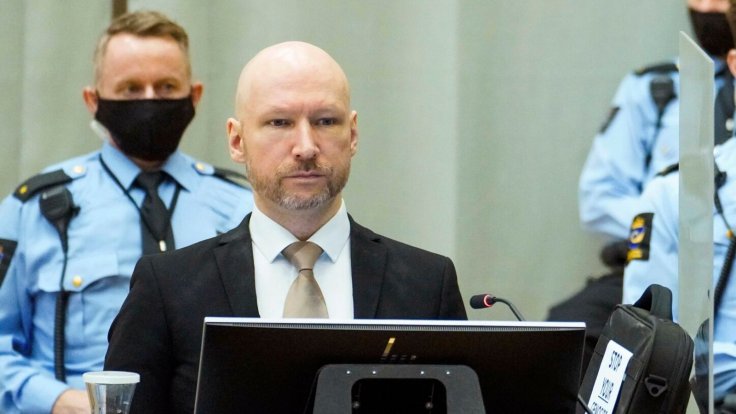Anders Behring Breivik, previously known as Fjotolf Hansen, the Norwegian right-wing extremist and neo nazi terrorist responsible for the 2011 bomb and gun rampage that claimed the lives of 77 people, has filed a lawsuit against the Norwegian state for the second time. On Monday, Breivik alleged that his solitary confinement since 2012 violates his human rights, deeming it inhumane under the European Convention on Human Rights.

Who is Anders Behring Breivik?
Anders Behring Breivik, extensively detailed in the book "One of Us: The Story of Anders Breivik and the Massacre in Norway" by investigative reporter Åsne Seierstad, committed the heinous act in 2011. Dressed as a police officer, he mercilessly murdered 69 boys and girls, along with eight adults, in a summer camp for young socialists on the island of Utøya, following a bomb attack in Oslo.
Early Life and Radicalization:
Breivik's troubled past includes his first arrest at the age of 16 for graffiti-related offenses. Raised in an affluent area of Oslo, he later chaired the local branch of the anti-immigration Progress Party at the age of 20. In 2005, he joined a gun club, and in 2009, declared no income according to Norwegian tax authorities. The financing of his terror attack, amounting to $142,000, was achieved through the use of nine credit cards. In his manifesto, titled "2083: A European Declaration of Independence," Breivik expressed strong opposition to Islam and Feminism.
Psychiatric Evaluations:
Before his 2012 trial, two teams of forensic psychiatrists were appointed by the court to examine Breivik. While the first team diagnosed him with paranoid schizophrenia, the second concluded that he had narcissistic personality disorder and antisocial personality disorder.
Legal Battles:
Breivik's legal saga continued in 2016 when he sued the Norwegian Correctional Service for violating his human rights. Despite a lower court ruling, the justice system dismissed the case. In 2017, he filed a complaint with the European Court of Human Rights, which met the same fate in 2018.
Parole Denied:
Despite becoming eligible for parole after serving ten years of his twenty-one-year sentence in January 2022, Breivik's request was denied by the court.
Current Confinement Conditions:
Presently, Breivik is housed in a two-story complex equipped with a kitchen, a dining room, a TV room featuring an Xbox, and several armchairs. Additionally, he has access to a fitness room with weights, a treadmill, and a rowing machine. However, according to Øystein Storrvik, Breivik's lawyer, he is unable to establish meaningful relationships with anyone from the outside world.
"He is presently grappling with suicidal thoughts," emphasized Oeystein Storrvik, Breivik's legal representative. Storrvik further noted that Breivik relies on the antidepressant Prozac to navigate his days in prison. Lawyers representing the justice ministry argue that Breivik's continued isolation from the general prison population is imperative due to the ongoing security threat he poses.
According to court documents filed by the justice ministry's legal team, Breivik's isolation is deemed "relative" given his interactions with guards, a priest, health professionals, and, until recently, an external volunteer whom Breivik has chosen not to meet. Additionally, he engages with two inmates for an hour every other week.
The legal team justifies stringent control over Breivik's external contacts by citing the risk of inspiring others to commit violent acts. They specifically point to concerns about connections with far-right circles, including those seeking contact with Breivik as a result of his terrorist acts on July 22, 2011. Brenton Tarrant, who carried out the Christchurch mosque shootings in 2019, cited Breivik as an inspiration.
Breivik is currently serving a 21-year sentence, the maximum allowed by Norwegian law, extendable as long as he is considered a societal threat.
Knut Mellingsaeter Soerensen, an associate professor at the Norwegian Police University College, highlighted the exceptional duration of Breivik's isolation. Soerensen, who authored a doctorate on Breivik's conditions in his first prison from 2011-2013, raised concerns about the challenge of determining when to ease security measures for an individual with a history of terrorist intentions.
In 2016, Breivik sued the state, alleging a breach of the European Convention on Human Rights, which prohibits "torture or inhuman or degrading treatment or punishment." Although he initially won the case, the decision was overturned on appeal before any restrictions were lifted.
The upcoming hearing on Monday is scheduled to take place in the prison's gymnasium, situated on the shore of Tyrifjorden lake, near the island of Utoeya where Breivik carried out his shooting spree in 2011.









